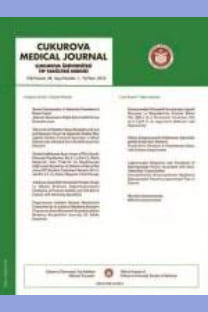Melissa officinalis L. bitkisinin apoptoz ve otofaji yoluyla insan meme kanser hücre hattı üzerine etkisi
Effect of Melissa officinalis L. on human breast cancer cell line via apoptosis and autophagy
___
- 1. Akkuzu MZ, Küçüköner M, Irtegun S, Akdeniz N, Urakçı Z, Kaplan MA et al. Meme kanserinde Brca-1 ve Brca-2’ de sık görülen polimorfizm mutasyonların bölgemizde varlığı. Dicle Med J. 2019;46:623-31.
- 2. Kampa M, Nifli AP, Notas G, Castanas E. Polyphenols and cancer cell growth. Rev Physiol Biochem Pharmacol. 2007;159:79-113.
- 3. Sonnenblick A, Fumagalli D, Sotiriou C, Piccart M. Is the differentiation into molecular subtypes of breast cancer important for staging, local and systemic therapy, and follow up? Cancer Treat Rev. 2014;40:1089-95.
- 4. Eliyatkin N, Yalcin E, Zengel B, Aktaş S, Vardar E. Molecular classification of breast carcinoma: from traditional, old-fashioned way to a new age, and a new way. J Breast Heal. 2015;11:59-66.
- 5. Comsa S, Cîmpean AM, Raica M. The story of MCF7 breast cancer cell line: 40 Years of experience in research. Anticancer Res. 2015;35:3147-54.
- 6. Sweeney EE, McDaniel RE, Maximov PY, Fan P, Craig Jordan V. Models and mechanisms of acquired antihormone resistance in breast cancer: Significant clinical progress despite limitations. Horm Mol Biol Clin Investig. 2012;9:143-63.
- 7. Baskal G, Köngül E, Karatoprak GS. Traditional Usage of Melissa officinalis. J Health Sci. 2017;26:267- 69.
- 8. Gurbuz P, Martinez A, Perez C, Martinez-Gonzalez L, Goger F, Ayran I. Potential anti-Alzheimer effects of selected Lamiaceae plants through polypharmacology on glycogen synthase kinase-3β, βsecretase, and casein kinase 1δ. Ind Crops Prod. 2019;138:111431.
- 9. Saraydin SU, Tuncer E, Tepe B, Karadayi S, Özer H, Şen M et al. Antitumoral effects of melissa officinalis on breast cancer in vitro and in vivo. Asian Pac J Cancer Prev. 2012;13:2765-70.
- 10. Weidner C, Rousseau M, Plauth A, Wowro SJ, Fischer C, Abdel-Aziz H et al. Melissa officinalis extract induces apoptosis and inhibits proliferation in colon cancer cells through formation of reactive oxygen species. Phytomedicine. 2015;22:262-70.
- 11. Encalada MA, Hoyos KM, Rehecho S, Berasategi I, García-Íñiguez de Ciriano M, Ansorena D et al. Antiproliferative effect of Melissa officinalis on Human Colon Cancer Cell Line. Plant Foods Hum Nutr. 2011;66:328-34.
- 12. Jahanban-Esfahlan A, Modaeinama S, Abasi M, Mesgari Abbasi M, Jahanban-Esfahlan R. Anti proliferative properties of Melissa officinalis in different human cancer cells. Asian Pac J Cancer Prev. 2015;16:5703-7.
- 13. Matsunaga K, Saitoh T, Tabata K, Omori H, Satoh T, Kurotori N et al. Two Beclin 1-binding proteins, Atg14L and Rubicon, reciprocally regulate autophagy at different stages. Nat Cell Biol. 2009;11:385-96.
- 14. Klionsky DJ, Abdelmohsen K, Abe A, Abedin MJ, Abeliovich H, Arozena AA et al. Guidelines for the use and interpretation of assays for monitoring autophagy (3rd edition). Autophagy. 2016;12:1-222.
- 15. Magalhães DB, Castro I, Lopes-Rodrigues V, Pereira JM, Barros L, Ferreira ICFR et al. Melissa officinalis L. ethanolic extract inhibits the growth of a lung cancer cell line by interfering with the cell cycle and inducing apoptosis. Food Funct. 2018;9:3134-42.
- 16. Ghiulai R, Avram S, Stoian D, Pavel IZ, Coricovac D, Oprean C et al. Lemon balm extracts prevent breast cancer progression in vitro and in ovo on chorioallantoic membrane assay. Evid Based Complement Alternat Med. 2020;2020:6489159.
- 17. Mosmann T. Rapid colorimetric assay for celluler growth and survival: application to proliferation and cytotoxicity assays. J Immunol Methods. 1983;65:55- 63.
- 18. Kumari S, Badana AK, Mohan GM, Naik GS, Malla RR. Synergistic effects of coralyne and paclitaxel on cell migration and proliferation of breast cancer cells lines. Biomed Pharmacother. 2017;91:436-45.
- 19. Maryam R, Faegheh S, Majid AS, Kazem NK. Effect of quercetin on secretion and gene expression of leptin in breast cancer. J Tradit Chin Med. 2017;37:321-5.
- 20. Dias MI, Barros L, Sousa MJ, Ferreira IC. Systematic comparison of nutraceuticals and antioxidant potential of cultivated, in vitro cultured and commercial Melissa officinalis samples. Food Chem Toxicol. 2012;50:1866-73.
- 21. Jahanban-Esfahlan R, Seidi K, Monfaredan A. The herbal medicine Melissa officinalis extract effects on gene expression of p53, Bcl-2, Her2, VEGF-A and hTERT in human lung, breast and prostate cancer cell lines.Gene. 2017;613:14-9.
- 22. Balunas MJ, Su B, Brueggemeier RW. Natural products as aromatase inhibitors. Anticancer Agents Med Chem. 2008;8:646-82.
- 23. Yesil-Celiktas O, Sevimli C, Bedir E, Vardar-Sukan F. Inhibitory effects of rosemary extracts, carnosic acid and rosmarinic acid on the growth of various human cancer cell lines. Plant Foods Hum Nutr. 2010;65:158-63.
- 24. Katary MA, Abdelsayed R, Alhashim A, Abdelhasib M, Elmarakby AA. Salvianolic acid b slows the progression of breast cancer cell growth via enhancement of apoptosis and reduction of oxidative stress, inflammation, and angiogenesis. Int J Mol Sci. 2019;20:5653.
- 25. Quan G, Chen W, Wen Y, Yan Y, Gu M, Pan Y. Chemoprotective efficacy of salvianolic acid B via triggering apoptosis in MCF-7 human breast cancer cells. Int J Pharm. 2019;15:110-5.
- ISSN: 2602-3032
- Yayın Aralığı: Yılda 4 Sayı
- Başlangıç: 1976
- Yayıncı: Çukurova Üniversitesi Tıp Fakültesi
N-asetilsisteinin rat böbreklerinde sisplatin ile indüklenen apoptoz üzerine etkisi
İnayet GÜNTÜRK, G. Şeyda SEYDEL, Fatma DAĞLI, Cevat YAZICI, Kader KÖSE, Arzu YAY
COVID-19 triajında CLUE protokolünün etkinliği
Hüseyin ACAR, Adnan YAMANOĞLU, Cüneyt ARIKAN, Serkan BİLGİN, Pınar Yeşim AKYOL, Ahmet KAYALI, Zeynep KARAKAYA
Sedef Gülçin URAL, İbrahim Hakkı TÖR
Pınar ERGENOĞLU, Zeynep ERSOY, Anış ARIBOĞAN
Mustafa TİMURKAAN, Hakan AYYILDIZ
Foramen magnum ve kranyumun uyumu: Anatomik ve radyolojik bir çalışma
Mahmut ÖKSÜZLER, Duygu VURALLI, Sema POLAT, Pınar GÖKER
Veysel KAPLANOĞLU, Hatice KAPLANOĞLU, Aynur TURAN, Alper DİLLİ
Çocuk femur ve tibia şaft kırıklarında kapalı redüksiyon ve titanyum elastik çivileme
Zeynel Mert ASFUROĞLU, Ahmet KÜÇÜK, Nusret KÖSE
COVID-19 pandemisinin sağlık profesyonellerinin aile ve sosyal hayatlarına etkisi
Refiye AKBOLAT, Hamide ŞİŞMAN, Dudu ALPTEKİN, Esma GÖKÇE, Sevban ARSLAN, Derya GEZER
Covid-19'da yeni potansiyel tedavi olarak Oxiris hemofiltreli CRRT: Bir vaka serisi
